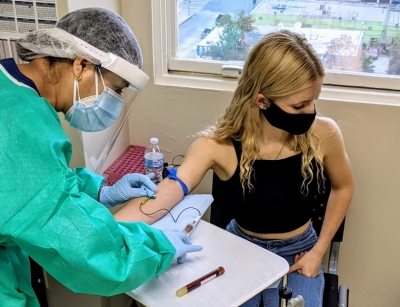
With COVID-19 cases rising once again in the country, the question foremost in the minds of parents is “Will the anti-COVID jabs for adolescents be ready before the next academic year?” One year into the pandemic, it’s only natural that parents do not feel confident about sending their wards to schools without getting them vaccinated. Most COVID-19 vaccines being rolled out worldwide are for adults, who are at higher risk from the novel coronavirus. But vaccinating children of all ages is critical to putting an end to the pandemic.
In these uncertain times, the news that BioNTech-Pfizer vaccine showed 100 % efficacy against the coronavirus in 12-to 15-year- olds offers hope. According to a statement issued by the companies on March 31, Phase 3 trials carried out on 2.260 adolescents in the United States “demonstrated 100 percent efficacy and robust antibody responses”. They plan to ask the U.S. Food and Drug
Administration and European regulators to allow emergency use of the shots for this age group in the coming weeks.
First to be approved
The BioNTech-Pfizer shot is based on novel mRNA technology and was the first COVID-19 vaccine to be approved in the West late last year.
Both the U.S. and the European Union have approved its use for people aged 16 and above. Ever since, it has been used in millions of adults in more than 65 countries.
Side effects in kids
Kids had side effects similar to young adults, according to Pfizer. The main side effects are pain, fever, chills, and fatigue, particularly after the second dose. The study will continue to track participants for two years for more information about long term protection and safety.
What about the dosage?
Pfizer gave the 12-and-older participants the same dose given to adults, while it is testing different doses in younger children.
Others in the pipeline
Pfizer isn’t the only company seeking to lower the age limit for its vaccine. Results are expected soon from a U.S. study of Moderna’s vaccine in 12- to 17 year-olds. The FDA has already allowed both companies to begin U.S. studies in children aged 11 and younger.
AstraZeneca also began a study of its vaccine among six- to 17 year-old children in Britain. However, going to press, the University of Oxford has paused the trial of the AstraZeneca vaccine in children and teenagers, amid blood clot concerns reported in adults administered the vaccine. Johnson & Johnson is planning its own studies in children. In China, Sinovac recently announced it has submitted preliminary data to Chinese regulators, showing its vaccine is safe in children as young as three.
Picture Credit : Google




